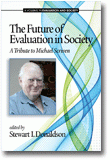
The Future of Evaluation in Society
A Tribute to Michael Scriven
By:
Stewart I. Donaldson, Claremont Graduate University
A volume in the series: Evaluation and Society. Editor(s): Stewart I. Donaldson, Claremont Graduate University. Katrina L. Bledsoe, Education Development Center.
Published 2013
The impetus for this volume lives in a rich and vibrant past. It is organized to honor one of the founders and most prolific contributors to the profession and transdiscipline of evaluation -- Professor Michael Scriven, and to illuminate the future of evaluation in society. Professor Scriven often shares stories of his meetings with Albert Einsten and the frame-breaking evaluation revolution he has led against the value free doctrine of the social sciences. Both his wide eyed graduate students and the more grizzled evaluation veterans in his professional development workshops quickly learn that Scriven is well traveled and has exchanged some of the boldest ideas and visions with the most brilliant thinkers of his time. Scriven insisted that the 2011 Stauffer Symposium and this volume be organized in that genre. He urged us to invite the most thoughtful and influential evaluation theorists and practitioners we could find to join him in a conversation about the future of evaluation in society.
Scriven challenges us to examine the five great paradigm shifts that have revolutionized the foundations of evaluation, and that he believes will form the basis for a much brighter future for evaluation in society. Scriven’s revolutionary ideas are followed and challenged by a group of thought leaders in evaluation who do not necessarily shared his views on evaluation, but who have earned his deepest respect and whose evaluation work he admires including Michael Quinn Patton, Ernest House, Daniel Stufflebeam, Robert Stake, Jennifer Greene, Karen Kirkhart, Melvin Mark, Rodney Hopson, and Christina Christie. However, despite his insistence that his colleagues stay focused on the future of evaluation, you will find that many have recounted their adventures, exchanges, and debates with him over the years, as well as pointed out the many contributions that he has made to the development of evaluation and to the improvement of society through his amazing portfolio of evaluation contributions.
The Future of Evaluation in Society: A Tribute to Michael Scriven will be of great interest to evaluation scholars, practitioners, and students of evaluation. It will be appropriate for use in a wide range of evaluation courses including Introduction to Evaluation, Evaluation Theory, and Evaluation Practice courses.
CONTENTS
Preface. Prologue—The Revolution Will Not Be Evaluated: An Ode to Gil Scot-Heron, Michael Scriven, and the Future of Evaluation, Rodney Hopson. Connecting Evaluation’s Past to its Future: Appreciating Scriven’s Legacy and Frame-Breaking Revolutions, Stewart I. Donaldson. The Foundation and Future of Evaluation, Michael Scriven. The Future of Evaluation in Society: Top Ten Trends Plus One, Michael Quinn Patton. Evaluation’s Conflicted Future, Ernest R. House. My Tribute to a Trail Blazer: Evaluation Iconoclast—Professor Michael Scriven, Daniel L. Stufflebeam. Michael Scriven and the Evaluation Lexicon, Christina A. Christie. The People and the Profession, Robert Stake. Consumers, Curmudgeons, and Courage: Traveling Evaluation’s Byways with Michael Scriven, Jennifer C. Greene. Advancing Considerations of Culture and Validity: Honoring the Key Evaluation Checklist, Karen E. Kirkhart. The Future of Evaluation in Society: Variations on a Theme, Melvin M. Mark. About the Contributors.
REVIEWS
"The 2011 Stauffer Symposium at the Claremont Colleges was intended to honor Michael Scriven for a half century of unflinching and unstinting leadership in evaluation. The Future of Evaluation in Society: A Tribute to Michael Scriven is the published record of this gathering. But, as editor Stewart Donaldson tells it, the guest of honor refused to attend until the spotlight turned to the future of evaluation." Linda Mabry Washington State University in American Journal of Evaluation (Read full review)
-
Paperback9781623964511
Web price: $45.04 (Reg. 52.99)
-
Hardcover9781623964528
Web price: $80.74 (Reg. 94.99)
- eBook9781623964535

- EDU037000 - EDUCATION: Research
- EDU011000 - EDUCATION: Evaluation & Assessment
- REF020000 - REFERENCE: Research
-
 Disrupting Program Evaluation and Mixed Methods Research for a More Just Society
The Contributions of Jennifer C. Greene
Disrupting Program Evaluation and Mixed Methods Research for a More Just Society
The Contributions of Jennifer C. Greene
-
 Evaluation for a Caring Society
Evaluation for a Caring Society
-
 Growing the Knowledge Base in Evaluation
The Contributions of J. Bradley Cousins
Growing the Knowledge Base in Evaluation
The Contributions of J. Bradley Cousins
-
 Outcome Harvesting
Principles, Steps, and Evaluation Applications
Outcome Harvesting
Principles, Steps, and Evaluation Applications
-
 Practical Wisdom for an Ethical Evaluation Practice
Practical Wisdom for an Ethical Evaluation Practice
-
 System Evaluation Theory
A Blueprint for Practitioners Evaluating Complex Interventions Operating and Functioning as Systems
System Evaluation Theory
A Blueprint for Practitioners Evaluating Complex Interventions Operating and Functioning as Systems
-
 Visionary Evaluation for a Sustainable, Equitable Future
Visionary Evaluation for a Sustainable, Equitable Future

